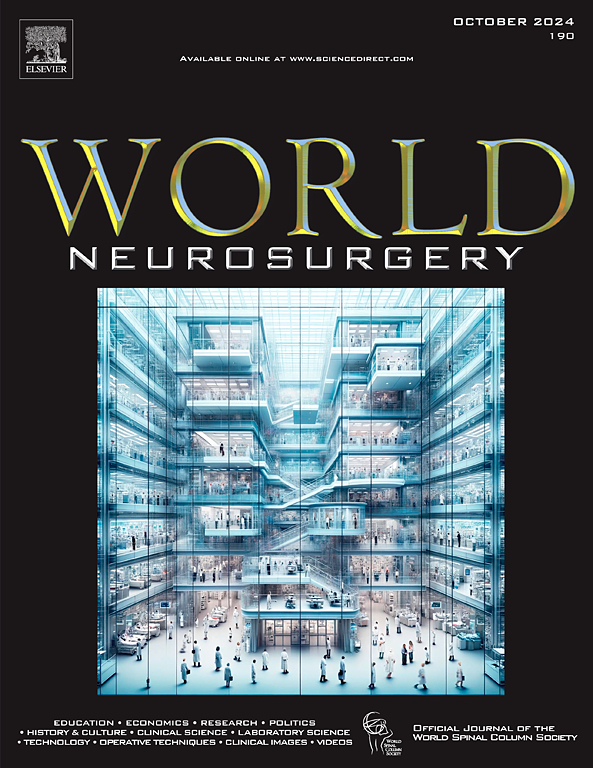Weill Cornell颅底和微神经外科技能为基础的神经外科奖学金:20年,200名研究员回顾。
IF 1.9
4区 医学
Q3 CLINICAL NEUROLOGY
引用次数: 0
摘要
背景:自2004年以来,Weill Cornell颅底和微神经外科奖学金在实验室环境中为来自世界各地的外科医生提供了复杂颅底解剖,方法和技术的结构化,熟练驱动的指导。我们报告了这个项目的设计,回顾了促成其成功的因素,并评估了过去20年来它对200名神经外科校友的影响。方法:为期6-12个月的奖学金项目是免费的,面向世界各地的外科医生,从老年住院医生到职业生涯中期的外科医生。该计划包括最初3个月的颅底外科解剖培训,随后3-9个月的颅底手术入路和技术培训。所有的训练都有严格的监督,并遵循覆盖整个颅底的标准化顺序解剖课程。为了评估奖学金项目的有效性和影响,所有校友都被要求完成一份详细的匿名调查,反映他们的经历及其对他们外科手术能力和职业生涯的影响。结果:截至2025年1月,来自57个国家的200名神经外科医生完成了奖学金计划,其中170人可以联系到,133人(78.2%)完成了调查。受访者表示,在奖学金之后,他们的整体神经外科技能,能力和装备增加了58.8%。研究结束后,特殊手术技能也有显著提高,其中颅底导航(80.4%)、颅底技术(74.7%)和并发症处理(70.4%)的进步最大。对颅底入路的总体信心增加了50.8%,其中外侧入路(76.6%)和后外侧入路(78.8%)的改善最大。作为一名神经外科医生,他们的总体信心显著提高了50.8%,并且大家强烈同意,该奖学金是他们神经外科训练的基础,并使他们成为更好的神经外科医生。98.5%的人会向其他神经外科医生推荐这个项目。结论:以实验室为基础的威尔康奈尔颅底和微神经外科奖学金对其校友产生了深远而积极的影响,显著提高了他们的外科技能和职业生涯。考虑到奖学金的持续时间有限,在奖学金之后获得的感知技能和能力的实质性提高尤其值得注意,这证明了这种专注的、有监督的培训模式可以作为基于技能的神经外科培训的全球基准。本文章由计算机程序翻译,如有差异,请以英文原文为准。
The Weill Cornell Skull Base and Microneurosurgery Skills-Based Neurosurgery Fellowship: A 20-Year, 200-Fellow Retrospective
Background
Since 2004, the Weill Cornell Fellowship in Skull Base and Microneurosurgery has provided surgeons from around the world with structured, proficiency-driven instruction in complex skull base anatomy, approaches, and techniques in a lab-based setting. We report on the design of this program, review the factors that have contributed to its success, and evaluate its impact on 200 neurosurgeon-alumni over the past 20 years.
Methods
The 6–12-month fellowship program is tuition-free and open to surgeons worldwide, from senior residents to mid-career surgeons. The program consists of an initial 3 months of training in skull base surgical anatomy, followed by 3–9 months of training in skull base surgical approaches and techniques. All training is closely supervised and follows a standardized sequential dissection curriculum covering the entirety of the skull base. In order to assess the effectiveness and impact of the fellowship program, all alumni were asked to complete a detailed anonymous survey reflecting on their experience and its influence on their surgical abilities and careers.
Results
As of January 2025, 200 neurosurgeons from 57 countries have completed the fellowship program, of which 170 were reachable and 133 (78.2%) completed the survey. Respondents indicated a substantial 58.8% increase in their overall neurosurgical skills, abilities, and armamentarium following the fellowship. A significant increase in specific surgical skills was similarly found post-fellowship, with the greatest improvements in navigating the skull base (80.4%), skull base techniques (74.7%), and complications management (70.4%). Overall confidence in performing skull base approaches increased by 50.8%, with the greatest improvements seen in lateral (76.6%) and posterolateral approaches (78.8%). Overall confidence as a neurosurgeon increased by a notable 50.8%, and there was strong agreement that the fellowship was fundamental to their neurosurgery training and made them better neurosurgeons. 98.5% would recommend the program to other neurosurgeons.
Conclusions
The lab-based Weill Cornell Fellowship in Skull Base and Microneurosurgery has had a profound and positive impact on its alumni, significantly enhancing their surgical skills and careers. The substantial degree of increases in perceived skills and abilities gained following the fellowship are especially notable given the fellowship’s limited duration and are evidence that this model of focused, supervised training could serve as a global benchmark for skills-based neurosurgical training.
求助全文
通过发布文献求助,成功后即可免费获取论文全文。
去求助
来源期刊

World neurosurgery
CLINICAL NEUROLOGY-SURGERY
CiteScore
3.90
自引率
15.00%
发文量
1765
审稿时长
47 days
期刊介绍:
World Neurosurgery has an open access mirror journal World Neurosurgery: X, sharing the same aims and scope, editorial team, submission system and rigorous peer review.
The journal''s mission is to:
-To provide a first-class international forum and a 2-way conduit for dialogue that is relevant to neurosurgeons and providers who care for neurosurgery patients. The categories of the exchanged information include clinical and basic science, as well as global information that provide social, political, educational, economic, cultural or societal insights and knowledge that are of significance and relevance to worldwide neurosurgery patient care.
-To act as a primary intellectual catalyst for the stimulation of creativity, the creation of new knowledge, and the enhancement of quality neurosurgical care worldwide.
-To provide a forum for communication that enriches the lives of all neurosurgeons and their colleagues; and, in so doing, enriches the lives of their patients.
Topics to be addressed in World Neurosurgery include: EDUCATION, ECONOMICS, RESEARCH, POLITICS, HISTORY, CULTURE, CLINICAL SCIENCE, LABORATORY SCIENCE, TECHNOLOGY, OPERATIVE TECHNIQUES, CLINICAL IMAGES, VIDEOS
 求助内容:
求助内容: 应助结果提醒方式:
应助结果提醒方式:


